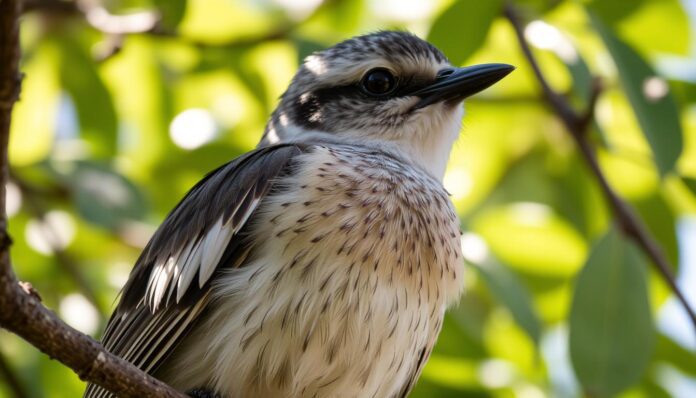If you own a bird, you might wonder Can Fleas Go on a Bird. The idea of fleas on your pet can be scary. But, the truth is more complicated than it seems.
Fleas rarely infest birds. But, there are some cases where it can happen. Knowing about this can help protect your bird. Let’s explore the world of birds and fleas together. We’ll learn what’s real and what’s not, so you can keep your pet safe.
Understanding the Relationship Between Birds and Fleas
Many people think birds get fleas, but they’re more likely to get mites and lice. Flea control services usually don’t help with bird parasites. Birds need special vet care for mite or lice treatments.
Types of Parasites That Affect Birds
Birds can get many parasites, like viruses and fungi. But mites and lice are the most common. These can make birds very sick if not treated.
Why Fleas Rarely Choose Birds as Hosts
Fleas like mammals better than birds. They prefer warmer bodies and different habitats. Birds are too cold and have feathers that fleas don’t like.
Also, birds’ nesting habits are not good for fleas. Places like sparrows’ nests are not ideal for flea growth.
Even though flea control for birds is rare, it’s important for pet owners to know. They should watch for other parasites and get vet help when needed. This keeps their birds healthy and happy.
Can Fleas Go on a Bird: Examining the Facts
Fleas on pet birds are rare. Fleas mainly feed on mammals, not birds. Only about 6% of flea species prefer birds.
Studies show that bird-loving fleas started with small mammals like chipmunks and squirrels. The Dasypsyllus gallinulae perpinnatus is a rare flea found in the western U.S. It’s not often seen by scientists or health experts.
Fleas on birds happen when birds walk on flea-infested floors or are outside in flea areas. In one case, 31 fleas were found in a home’s front entryway. Another 20 were found inside, and 387 were in an abandoned bird nest.
| Location | Number of Fleas Recovered |
|---|---|
| Front Entryway | 31 |
| Indoors | 20 |
| Abandoned Bird Nest | 387 |
All fleas in this case were D.g. perpinnatus. They were in all life stages in the bird nest. Keeping a clean, flea-free home is key for bird health.
Pet owners should watch where their birds go. Avoid areas with lots of foot traffic or known flea problems. Knowing fleas are rare on birds helps keep them healthy.
Common Parasites That Actually Affect Pet Birds
While fleas are often linked with cats and dogs, birds can face other parasites like mites and lice. It’s important to know the differences between these bird-specific parasites. This knowledge helps in preventing and treating them effectively.
Bird Mites and Their Impact
Mites are common parasites in pet birds. They can cause itching, feather loss, and inflammation. Bird mite prevention is key to keeping your bird healthy.
Avian Lice Identification
Lice are less common in pet birds than mites but can be a problem. They feed on skin scales and feather debris. Identifying and treating bird ectoparasites like lice is vital for a bird’s health.
Differences Between Fleas and Bird-Specific Parasites
Fleas can affect birds too, causing itching, bumps, and anemia. But mites and lice are more adapted to birds. They are more likely to infest avian species.
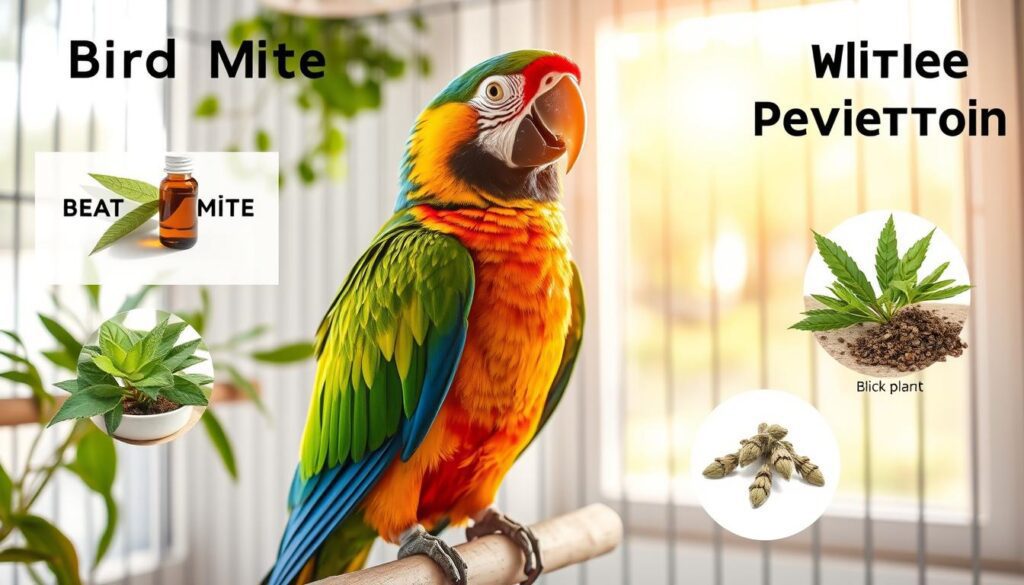
You May Like This : Can Birds eat Cranberries? – Feeding Guide & Safety
Identifying Signs of Parasite Infestation in Birds
As a bird owner, it’s key to spot signs of parasites in your birds. While flea infestation on birds is rare, other bird ectoparasites and avian parasites can harm your pet. Early detection helps you act fast to keep your bird healthy.
Excessive scratching or grooming is a common sign of parasites. If your bird is preening or scratching a lot, it might have parasites. Also, look for tiny mites or lice on their skin or feathers.
Feather damage is another sign of parasites. If your bird’s feathers look damaged, discolored, or uneven, it might be trying to get rid of parasites. In bad cases, the bird might lose feathers due to the irritation.
It’s vital to tell apart flea infestation on birds from other bird ectoparasites like mites or lice. The symptoms might look similar, but the treatment varies. Always get a vet’s advice for a correct diagnosis and treatment plan.
| Parasite Type | Identifying Symptoms |
|---|---|
| Bird Mites | Excessive itching, feather damage, visible mites on the skin or feathers |
| Avian Lice | Feather damage, visible lice on the skin or feathers, increased preening |
| Intestinal Parasites | Weight loss, diarrhea, decreased appetite, lethargy |
By watching for early signs of flea infestation on birds or other bird ectoparasites, you can act quickly. Regular vet visits and preventive steps help keep your bird healthy and happy. Remember, a parasite-free environment is key for your bird’s well-being.
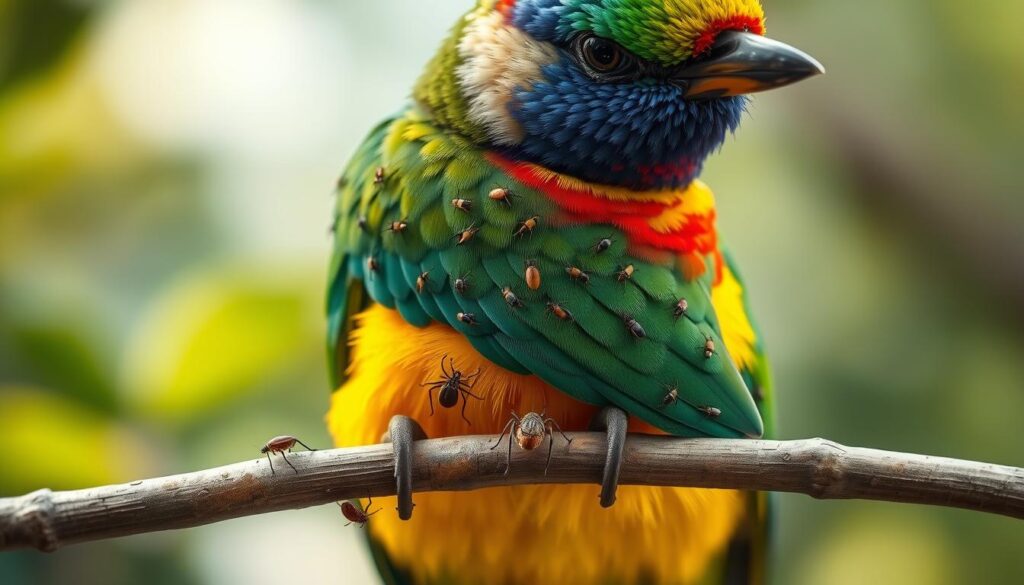
Risk Factors for Flea Exposure in Pet Birds
As devoted pet owners, it’s key to know the risks fleas pose to our feathered friends. Fleas don’t usually pick birds as their main hosts. But, some situations can up the risk for pet birds.
Indoor vs Outdoor Bird Exposure
Birds that roam freely indoors or outdoors face a higher flea risk. Fleas can take up to three months to go from egg to adult. This makes it easier for them to thrive where birds can access.
Contact with Other Pets
When birds meet flea-infested pets, like dogs or cats, the risk goes up a lot. Keeping all pets flea-free is vital to preventing fleas in aviaries and protecting flea risk for pet birds.
Environmental Risk Factors
The environment where birds live also affects their flea risk. Warm temperatures and high humidity are perfect for fleas. It’s important to tackle these environmental risks to keep your birds safe and healthy.
| Risk Factor | Impact on Bird Flea Exposure |
|---|---|
| Indoor vs Outdoor Bird Access | Outdoor birds have a higher risk of flea exposure |
| Contact with Other Pets | Exposure to flea-infested pets increases flea risk for birds |
| Environmental Conditions | Warm, humid environments favor flea reproduction and survival |
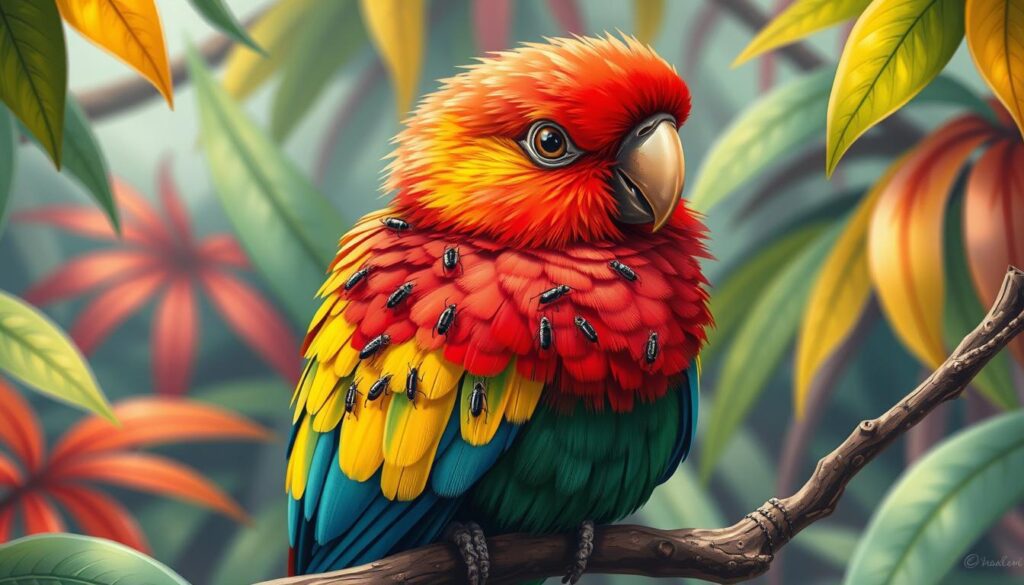
Understanding theseflea risk for pet birds helps you protect your feathered friends. You can keep a healthy, flea-free home for all your pets.
Prevention Strategies for Bird Owners
As a bird owner, it’s important to protect your feathered friend from parasites. This includes fleas, bird mites, and other infestations. By using effective prevention strategies, you can keep your bird healthy and free from parasites. Here are some tips to help you:
- Keep Birds Off the Floor – Limiting your bird’s exposure to the floor can significantly reduce the risk of flea infestations. Provide perches, stands, and elevated areas to keep your bird off the ground.
- Monitor for Signs of Parasites – Regularly inspect your bird and its environment for any signs of fleas, mites, or other parasites. Early detection is key to preventing larger infestations.
- Maintain a Clean Environment – Regularly clean and disinfect your bird’s cage, perches, and surrounding areas to eliminate any parasites.
- Consider Natural Repellents – Research and use natural repellents like tea tree oil mixtures that can help deter fleas and mites. But be cautious as some essential oils may be harmful to birds.
By following these prevention strategies, you can protect your bird from flea control for birds, bird mite prevention, and preventing fleas in aviaries. Remember, taking proactive measures is key to keeping your feathered friend healthy and happy.
| Prevention Tip | Benefit |
|---|---|
| Keep Birds Off the Floor | Reduces risk of flea infestations |
| Monitor for Signs of Parasites | Early detection helps prevent larger infestations |
| Maintain a Clean Environment | Eliminates any parasites |
| Consider Natural Repellents | Can help deter fleas and mites, but use caution with birds |
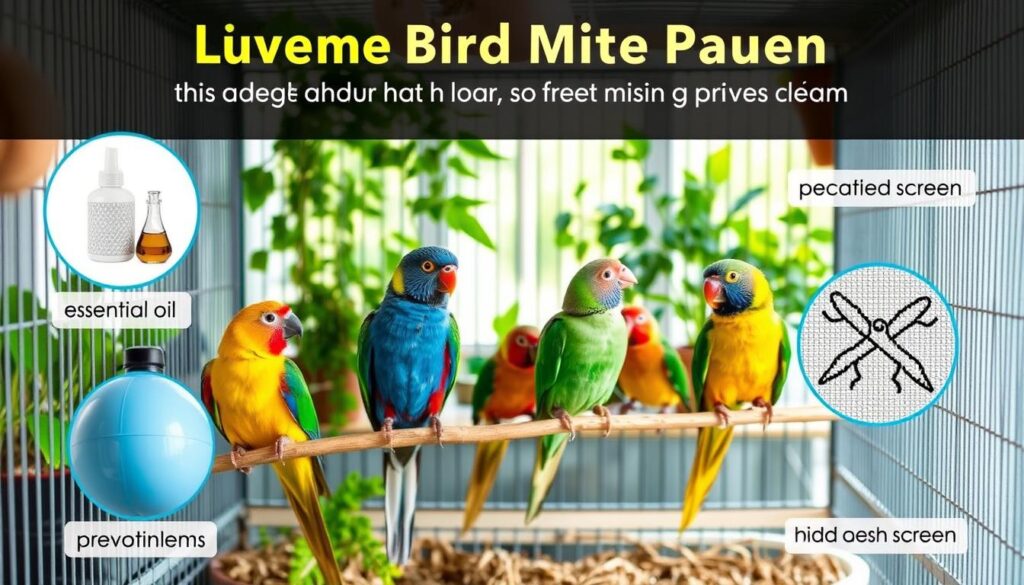
Safe Treatment Options for Bird Parasites
Dealing with bird ectoparasites like mites and lice requires professional help. These tiny pests can harm your bird’s health if not treated. Natural remedies for dogs and cats, like tea tree oil, are toxic to birds.
Veterinary Solutions
For safe treatment of avian parasites, see an avian vet. They can identify the parasite and give the right medicine. Treatments might include antiparasitic drugs or cleaning the bird’s space.
Natural Treatment Methods
- Keep your bird’s home clean and stress-free to prevent flea control for birds.
- Check new birds for health issues, including parasites, before adding them to your pets.
- Don’t use mite protectors or other bird-unfriendly products, as they can be harmful.
Quick action is key when dealing with bird ectoparasites. Ignoring the problem can cause serious health problems for your bird. Always work with your vet to keep your bird safe and healthy.
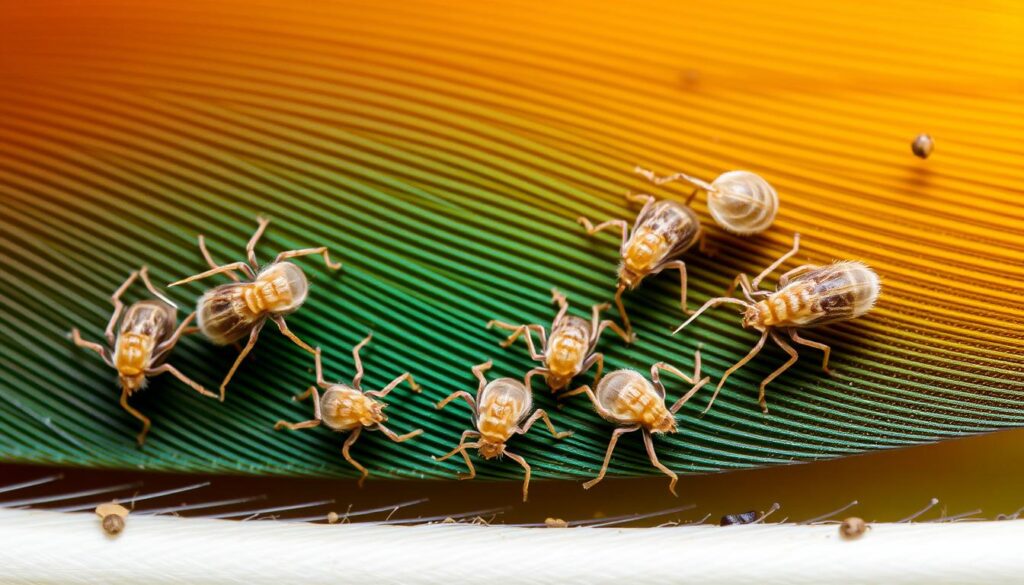
Maintaining a Parasite-Free Environment for Birds
Keeping your birds healthy starts with a clean home. As a bird owner, it’s vital to stop parasites before they start. Simple steps can protect your bird from fleas, mites, and other parasites.
Clean the bird’s area often. Use flea collars in your vacuum to catch fleas. A clean home lowers the chance of fleas harming your bird.
Birds in the wild don’t usually get fleas or worms. They eat these parasites naturally. But, birds in cages need extra care to stay free of parasites.
Fleas aren’t a big worry for most pet birds. But, bird mite prevention is key. Mites like Feather-Mites and Scaly-Face Mites can make birds very sick if not treated.
| Parasite | Symptoms | Treatment |
|---|---|---|
| Feather-Mites | Feather loss, skin irritation | Ivermectin injection |
| Scaly-Face Mites | Crusty, scaly skin | Ivermectin injection |
| Intestinal Worms | Diarrhea, weight loss, anemia | Annual deworming |
Keep your home clean, watch for parasite signs, and get vet help fast. This way, your bird stays healthy and happy. Remember, stopping parasites early is the best way to keep your bird’s home clean.
When to Seek Professional Veterinary Care
As a bird owner, watching for bird ectoparasites or avian parasites is key. While flea infestation on birds is rare, other parasites can be a problem. If your bird keeps scratching, has damaged feathers, or shows parasites, it’s time to see a vet.
Bird parasites are different from those in mammals. A vet can spot the right parasite and treat it. Trying to fix it yourself can be dangerous and make things worse. So, it’s best to get a vet’s help.
- Persistent scratching or grooming behavior
- Visible signs of parasites on the bird’s feathers or skin
- Damage or loss of feathers
- Changes in the bird’s overall health or behavior
If you see any of these signs, book a vet visit. They can check your bird, find the problem, and give the right treatment. This will help your bird get better fast.
Special Considerations for Multi-Pet Households
Having both birds and other pets at home means you need to watch out for fleas more closely. Fleas usually like mammals, but they can also bother birds, mainly when there’s a big infestation. Keeping your dogs and cats flea-free can help protect your birds too.
It’s important to stay ahead of fleas in homes with many pets. Fleas and feathered pets can live together, but you must keep your flea risk for pet birds low. Use flea prevention on your dogs and cats to stop fleas from reaching your birds.
Don’t forget to groom and check your pets regularly for fleas. Look for fleas or flea dirt on your birds and other pets too. Spotting fleas early can stop a big problem from happening.
| Flea Facts | Impact on Multi-Pet Households |
|---|---|
| Fleas have been present for around 125 to 150 million years, evolving in the early Cretaceous or Jurassic ages. | Fleas can easily spread between different pets in a multi-pet household, posing a risk to all animals, including birds. |
| There are approximately 2,500 species of fleas classified into 15 families and 220 genera, with five families and 25 genera parasitizing birds while all other fleas parasitize mammals. | While most fleas prefer mammalian hosts, the presence of bird-specific fleas means that birds in multi-pet homes are not entirely immune to flea infestations. |
| Dogs may carry fleas originating from birds, rodents, insectivores, and other Carnivora due to their habits, coming into contact with various animals while seeking behavior. | Dogs can act as a bridge, introducing fleas from other sources into the home, potentially exposing birds to the risk of infestation. |
Being careful and proactive about fleas is essential for all pets in your home. This includes your feathered friends. A good flea management plan keeps everyone healthy and safe.
Conclusion
Fleas on birds are rare, but bird owners should know about the risk. Birds don’t get fleas like dogs or cats do. But, they can get other parasites like mites and lice.
It’s key to know about bird parasites, their signs, and how to prevent and treat them. This keeps your bird healthy and happy.
Keep your bird’s area clean and watch for any changes in them. This helps catch problems early. A clean environment and quick vet visits are important.
Even though fleas are rare on birds, knowing about bird parasites is vital. It helps both birds and people stay healthy. By being informed and taking care, you protect your bird and help the bird community.
FAQ
Can fleas go on a bird?
Fleas usually don’t bother birds, but it can happen. Birds might scratch if they have mites or lice, not fleas. But, in rare cases, birds can get fleas if they walk on floors with fleas or are outside where fleas are.
What types of parasites are more common in birds?
Birds often face problems with tiny mites and lice, not fleas. You can’t get these parasites treated by pest control. Instead, you need to see a vet.
Why are fleas less likely to infest birds?
Fleas like mammals more than birds. This is because birds are different in temperature and where they live.
When are birds more at risk of flea infestations?
Birds are more likely to get fleas when they walk on floors with fleas or are outside. Summer is a riskier time because birds are more likely to be outside then.
How can I prevent flea infestations in my bird?
Keep your bird off the floor and limit their outdoor time. Check all pets for fleas or parasites. Keep your home clean and use natural repellents for dogs and cats, but not for birds.
What are the signs of parasite infestations in birds?
Look for signs like a bird scratching a lot, feather damage, or seeing parasites on their skin or feathers.
What is the best way to treat parasites in birds?
Birds need vet care for parasites. Don’t use tea tree oil on birds. Talk to a vet for safe treatments for birds.
How do I maintain a parasite-free environment for my bird?
Clean and vacuum your bird’s area often. Put flea collars in bags to kill fleas. Keep your home clean to avoid fleas that could harm your bird.
When should I seek veterinary care for my bird?
If your bird scratches a lot, has feather damage, or you see parasites, see a vet. A vet can find the problem and treat it, which is important because bird parasites are different.
How do I protect my bird in a multi-pet household?
Watch for fleas on all pets in your home. Fleas can affect birds in bad cases. Keep dogs and cats flea-free to protect your bird.


